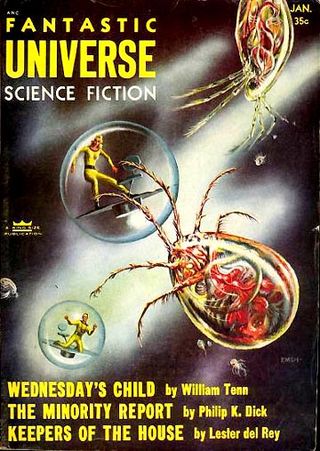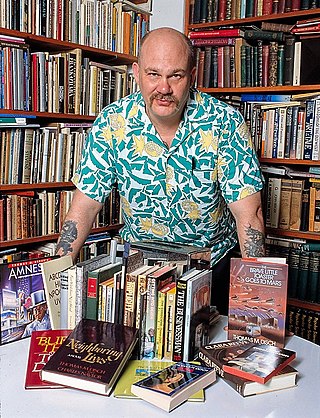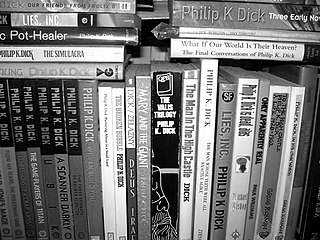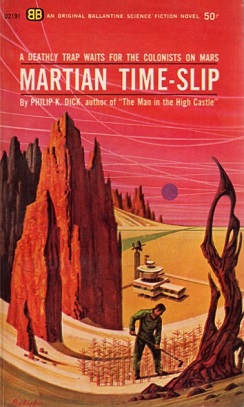
Philip Kindred Dick, often referred to by his initials PKD, was an American science fiction writer and novelist. He wrote 44 novels and about 121 short stories, most of which appeared in science fiction magazines during his lifetime. His fiction explored varied philosophical and social questions such as the nature of reality, perception, human nature, and identity, and commonly featured characters struggling against elements such as alternate realities, illusory environments, monopolistic corporations, drug abuse, authoritarian governments, and altered states of consciousness. He is considered one of the most important figures in 20th-century science fiction.

A Scanner Darkly is a science fiction novel by American writer Philip K. Dick, published in 1977. The semi-autobiographical story is set in a dystopian Orange County, California, in the then-future of June 1994, and includes an extensive portrayal of drug culture and drug use. The novel is one of Dick's best-known works and served as the basis for a 2006 film of the same name, directed by Richard Linklater.

Do Androids Dream of Electric Sheep? is a 1968 dystopian science fiction novel by American writer Philip K. Dick. It is set in a post-apocalyptic San Francisco, where Earth's life has been greatly damaged by a nuclear global war, leaving most animal species endangered or extinct. The main plot follows Rick Deckard, a bounty hunter who has to "retire" six escaped Nexus-6 model androids, while a secondary plot follows John Isidore, a man of sub-par IQ who aids the fugitive androids.

The Man in the High Castle is an alternative history novel by Philip K. Dick, first published in 1962, which imagines a world in which the Axis Powers won World War II. The story occurs in 1962, fifteen years after the end of the war in 1947, and depicts the life of several characters living under Imperial Japan or Nazi Germany as they rule a partitioned United States. The eponymous character is the mysterious author of a novel-within-the-novel entitled The Grasshopper Lies Heavy, a subversive alternative history of the war in which the Allied Powers are victorious.

Raphael Aloysius "R. A." Lafferty was an American science fiction and fantasy writer known for his original use of language, metaphor, and narrative structure, Lafferty also wrote a set of four autobiographical novels, a history book, and several novels of historical fiction.

Flow My Tears, the Policeman Said is a 1974 science fiction novel by American writer Philip K. Dick. The novel is set in a futuristic dystopia where the United States has become a police state in the aftermath of a Second American Civil War. The story follows genetically enhanced pop singer and television star Jason Taverner who wakes up in a world where he has never existed.
"Second Variety" is a science fiction novelette by American writer Philip K. Dick, first published in Space Science Fiction magazine, in May 1953. Set in a world where war between the Soviet Union and United Nations has reduced most of the world to a barren wasteland, the story concerns the discovery, by the few remaining soldiers left, that self-replicating robots originally built to assassinate Soviet agents have gained sentience and are now plotting against both sides. It is one of many stories by Dick examining the implications of nuclear war, particularly after it has destroyed much or all of the planet.

"The Minority Report" is a 1956 science fiction novella by American writer Philip K. Dick, first published in Fantastic Universe. In a future society, three mutants foresee all crime before it occurs. Plugged into a great machine, these "precogs" allow a division of the police called Precrime to arrest suspects before they can commit any actual crimes. When the head of Precrime, John Anderton, is himself predicted to murder a man whom he has never heard of, Anderton is convinced a great conspiracy is afoot.

Thomas Michael Disch was an American science fiction writer and poet. He won the Hugo Award for Best Related Book —previously called "Best Non-Fiction Book" —in 1999. He had two other Hugo nominations and nine Nebula Award nominations to his credit, plus one win of the John W. Campbell Memorial Award, a Rhysling Award, and two Seiun Awards, among others.
"The Variable Man" is a science fiction novella by American writer Philip K. Dick, which he wrote and sold before he had an agent. It was first published in the British magazine Space Science Fiction Vol. 2 No. 2, July 1953, and in the American version in September 1953, with the US publication illustrated by Alex Ebel. Despite the magazine cover dates it is unclear whether the first publication was in the UK or in the United States where magazines tended to be published farther ahead of their cover dates than in the UK. The Variable Man can be found in several collections of Dick's short stories, including The Variable Man and The Short Happy Life of the Brown Oxford.
"The Last of the Masters" is a science fiction novelette by American writer Philip K. Dick. The original manuscript of the story was received by the Scott Meredith Literary Agency on July 15, 1953, and the story was published by the Hanro Corporation in the final issue of Orbit Science Fiction in 1954. It has since been reprinted in several Philip K. Dick story collections, beginning with The Golden Man in 1980.

"Strange Eden" is a science fiction short story by American writer Philip K. Dick. It was first published in Imagination magazine during 1954, found under Second Variety and Other Classic Stories by Philip K. Dick in pp. 111–121.
"Roog" is a science fiction short story by American writer Philip K. Dick. It was his first sold work, although not his first published story.

The bibliography of Philip K. Dick includes 44 novels, 121 short stories, and 14 short story collections published by American science fiction author Philip K. Dick during his lifetime.

The Collected Stories of Philip K. Dick is a collection of 118 science fiction stories by American writer Philip K. Dick. It was first published by Underwood-Miller in 1987 as a five volume set. See Philip K. Dick bibliography for information about the mass market reprints.

Martian Time-Slip is a 1964 science fiction novel by American writer Philip K. Dick. The novel uses the common science fiction concept of a human colony on Mars. However, it also includes the themes of mental illness, the physics of time and the dangers of centralized authority.

"Mr. Spaceship" is a science fiction short story by American writer Philip K. Dick, first published in Imagination in January 1953, and later in The Collected Stories of Philip K. Dick. It has since been republished several times, including in Beyond Lies the Wub in 1988.
"Out In The Garden" is a science fiction short story by American writer Philip K. Dick, first published in 1953 in the magazine Fantasy Fiction. It has since been republished several times, including in the collections Beyond Lies the Wub in 1988.
"The Hanging Stranger" is a science fiction-horror short story by American writer Philip K. Dick, originally published in December 1953 in the magazine Science Fiction Adventures. It has been reprinted in several anthologies, and published in French, Italian and German. It was adapted by Dee Rees into the episode "Kill All Others" or "K.A.O." for the 2017 television series Philip K. Dick's Electric Dreams. A book was also released to republish "The Hanging Stranger" along with the nine other stories on which the Electric Dreams episodes were based.
"If You Find This World Bad, You Should See Some of the Others", also known as the "Metz speech", is a 1977 essay and speech by science fiction writer Philip K. Dick that was delivered at the Second Metz International Science Fiction Festival in Metz, France, on September 24, 1977. Dick, the guest of honor at the festival, was asked to deliver a shorter version of the original speech due to time constraints. The Metz speech, in its shorter form, was originally recorded on video and was translated to the French audience by an interpreter.













